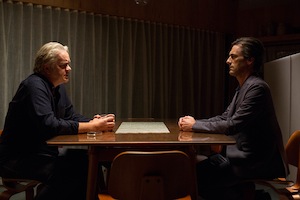Direction: Michael Almereyda
Country: USA
In recent times, American director Michael Almereyda has been increasing significantly his group of admirers with curious films such as Experimenter (2015) and Marjorie Prime (2017). However, he unsuccessfully attempts to inject chunks of modernity (e.g. a laptop, a cell phone, roller-skates and modern pop songs weren’t suppose to appear in a reconstruction of the late 1800s) in Tesla, a dismal biographical account of the Serbian-American inventor who majorly contributed to the development of the AC electricity supply system.
Although not technically exhaustive, the film drags for several periods of time while building up a husky atmosphere with a slightly tense score and lifeless visuals.
Played without brilliance by Ethan Hawke, the humorless and low-profile Tesla is seen disputing electrical theories with his former employer Thomas Edison (Kyle MacLachlan), bashfully flirting with Anne Morgan (Eve Hewson) - the film’s narrator and the daughter of his powerful financier, J.P. Morgan (Donnie Keshawarz) - and bewitching the famous French actress Sarah Bernhardt (Rebecca Dayan).
The film also takes time to address the issues found in the very first execution by electric chair. However, if the pace needed intensification, then the low budget certainly hampered Almereyda to shot the film in 35mm as it was planned. Still, the worst moment of the film coincides with Tesla’s cheap interpretation of Tears For Fears’ "Everybody Wants to Rule the World", a smashing hit from the 1980's.
Like Tesla, perhaps Almereyda wanted to look ahead. Yet, this loosely adapted biopic never goes in the right direction with its unstylish retro-modern hybridity.





